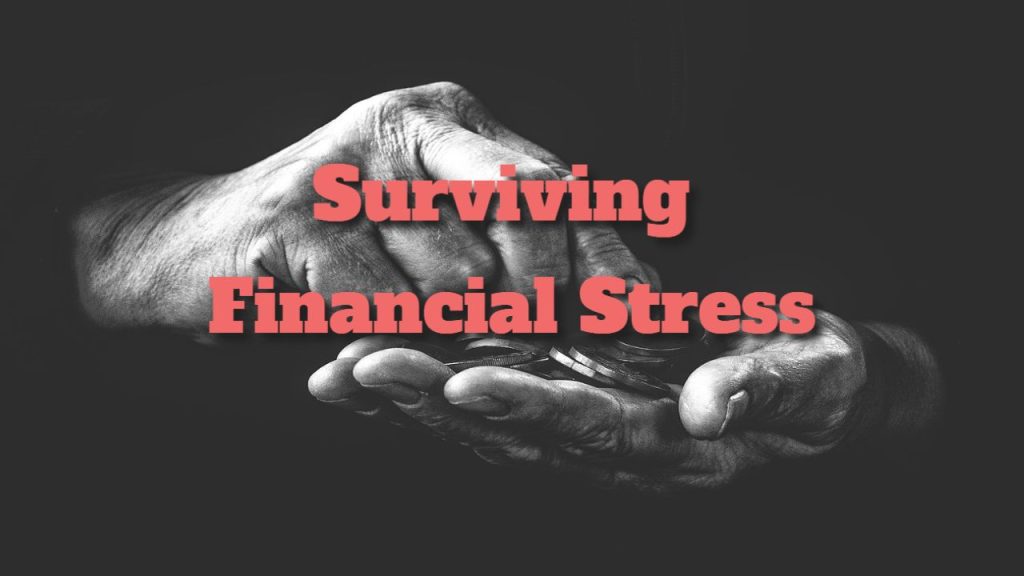Surviving Financial Stress
Visualise yourself on a roller coaster, experiencing an accelerated pulse rate as you ascend to the highest point, whilst feeling a mixture of excitement and apprehension for what lies ahead. Financial stress, akin to a roller coaster, can induce feelings of overload and discomfort.
However, the fact remains: You can accomplish it. We will examine pragmatic strategies for effectively handling financial stress, regaining authority, and attaining financial stability.
Identifying Root Causes
To properly alleviate financial stress, it is imperative to ascertain the underlying causes of your financial difficulties. Engage in a process of introspection and carefully evaluate your current financial circumstances.
Are you excessively expending your financial resources? Do you exceed your financial capacity? Your current pay may not be adequate to meet all of your expenses. You may also need to increase your savings or enhance your proficiency in financial management.
Recognizing these concerns is essential as it allows you to build a meticulous plan to eradicate them. Commence by establishing a budget to monitor and record your expenditures and earnings. Minimise superfluous expenditures and explore alternate avenues to augment your earnings, such as engaging in a supplementary occupation or negotiating a salary boost.
Develop a realistic budget.
To properly tackle the root causes of your financial stress, you must establish a pragmatic budget.
A proper budget serves as a practical tool to navigate your financial journey, enabling you to precisely monitor your income and expenditures.
Commence by enumerating the total amount of money in your bank account, including funds acquired from salaries, investments, or any other origins.
Subsequently, enumerate your monthly expenditures, encompassing rent, utilities, groceries, and transportation. Ensure to specify any outstanding debts or payments towards savings.
After obtaining a comprehensive overview of your financial situation, proceed to evaluate and contrast your earnings and expenditures. This might assist you in identifying potential areas for reducing costs and achieving savings.
Make sure to frequently evaluate and modify your budget to ensure that it is feasible and in line with your financial objectives.
Develop good money-management habits.
Initiate the cultivation of effective money management strategies to gain mastery over your finances and alleviate financial strain.
Cultivating these behaviours is essential for achieving enduring financial stability.
Initially, it is imperative to meticulously monitor your expenses. It is important to meticulously monitor all of your expenses to have a clear understanding of where your money is being allocated.
Create a financial plan and adhere to it consistently. Allocate your funds into distinct areas, such as expenses, savings, and discretionary expenditures. Place higher importance on setting aside funds for unforeseen circumstances and objectives that extend over a significant period.
Maintain a consistent plan for analysing and changing your budget.
Another essential practice is to pay bills on time to prevent late fees and penalties. Automating bill payments can help you meet all deadlines consistently.
Seek expert financial advice.
After establishing the routine of effectively handling your finances, it can be advantageous to pursue expert financial guidance.
Engaging the services of a competent financial advisor can offer crucial expertise and direction to assist you in making consequential financial choices. They possess the expertise and expertise to assess your financial circumstances, pinpoint areas for enhancement, and provide you with customised strategies to assist you in attaining your objectives.
A financial advisor can assist with budgeting, debt management, retirement planning, and formulating investment plans. With their aid, you may resolve intricate financial obstacles and build a comprehensive strategy that fulfils your specifications.
Practice self-care and stress-management skills.
Allocate dedicated time for personal activities and give high importance to self-care in order to efficiently handle financial stress. When addressing financial matters, it is effortless to neglect one's personal welfare. Nevertheless, practicing self-care is crucial for preserving one's mental and emotional well-being amidst these challenging circumstances.
Commence by choosing pastimes that provide you joy and provide a means to relax. Examples of activities that could be included are strolling, reading, or listening to music. Engaging in hobbies and practicing self-care routines can offer valuable respite from the burden of financial stress.
Yoga, meditation, and deep breathing techniques can effectively alleviate stress by diminishing anxiety and enhancing relaxation. These exercises may be performed in any location, making them an excellent tool for managing stress.
Here are some tips:
What strategies can I employ to effectively address our financial difficulties with my spouse/partner and collaboratively identify solutions?
Engaging in open and transparent discussions with your spouse or partner regarding financial difficulties facilitates efficient communication.
Collaborate by engaging in dialogue, actively listening, and brainstorming to find resolutions.
Are there any legal options for dealing with debt and financial stress?
Sure, there are some. When it comes to regaining control over your financial situation, two common legal choices are filing for bankruptcy and consolidating your debts.
It is important to have a positive attitude when dealing with the emotional repercussions of financial stress. What are some strategies that can help you do this?
By taking care of yourself, you may overcome the emotional repercussions of financial stress and keep a positive attitude throughout the process.
The act of seeking help from family and friends is yet another useful approach for dealing with the stress caused by financial issues.
You can also maintain your motivation and happiness by concentrating on the smaller successes you achieve.
How can I deal with the stresses of life, including those related to my finances as well as other challenges, such as my health or my relationships?
Setting self-care as a priority enables you to manage other challenges in your life while simultaneously coping with the stress caused by your financial situation.
This encompasses pursuits that bring about feelings of joy and relaxation, such as going for walks in the woods, engaging in mindfulness practices like meditation, and engaging in fascinating hobbies.
Important parts of self-care include getting enough amount of sleep, eating meals that are high in nutrients, and taking breaks whenever they are required.
Seeking aid from loved ones is yet another method for coping with the stress caused by financial issues. Telling a trusted member of your family or a close friend about your issues with money might provide you with emotional support and new views.
In addition to this, they can offer you practical advice or direct you to resources that can assist you with your finances.
Maintaining a healthy outlet for stress can be beneficial, in addition to taking care of oneself and seeking support when necessary.
Regular exercise has a relaxing impact and may boost your mood.
You can feel more energized and better able to deal with stress by participating in activities such as jogging, yoga, or joining a sports team.
Seeking professional assistance in the form of therapy or counseling may prove to be beneficial if financial difficulties become too severe.
In addition to assisting you in developing a financial strategy, a therapist can teach you ways to manage stress. In addition to this, they can offer a safe environment in which you can express your feelings and emotions without fear of being judged.
Does the government offer any programs or services that can assist individuals or families who are experiencing financial difficulties?
Services and resources provided by the government could be beneficial to individuals and families who are experiencing difficulties with their finances.
These programs can offer you financial assistance, counseling, and other sorts of support to assist you in getting through challenging times.
Individuals and families with low incomes can receive financial assistance in the form of grants, loans, and other programs.
There are major conditions to meet to participate in many of these programs. Before applying, it is essential to acquire knowledge regarding the requirements.
Additionally, counseling services are provided to assist individuals and families in managing their finances and developing a strategy to get back on track. These services are accessible in addition to financial support.
In addition to assisting with budgeting and debt management, these programs can also help with other financial concerns.
If you are experiencing troubles with your finances, you should investigate and make use of these services.
It is important to keep in mind that you are not alone and that there are programs and resources available to assist you in getting through these challenging times.
The reduction of financial stress can be accomplished by the understanding of the causes, the creation of a budget that is realistic, and the development of great strategies for managing money.
Furthermore, to effectively cope with the stress caused by financial matters, it is essential to seek the guidance of a professional financial advisor, as well as to develop skills in self-care and stress management.
Keep in mind that your health should be your top priority, and work towards achieving financial security by taking baby measures. You can triumph over difficulties in your financial situation if you are determined and patient.
The post Surviving Financial Stress appeared first on Survival Avenue.
The Article Surviving Financial Stress was found at https://limitsofstrategy.com
The Article Surviving Financial Stress First Appeared ON
: https://ad4sc.com







Comments are closed